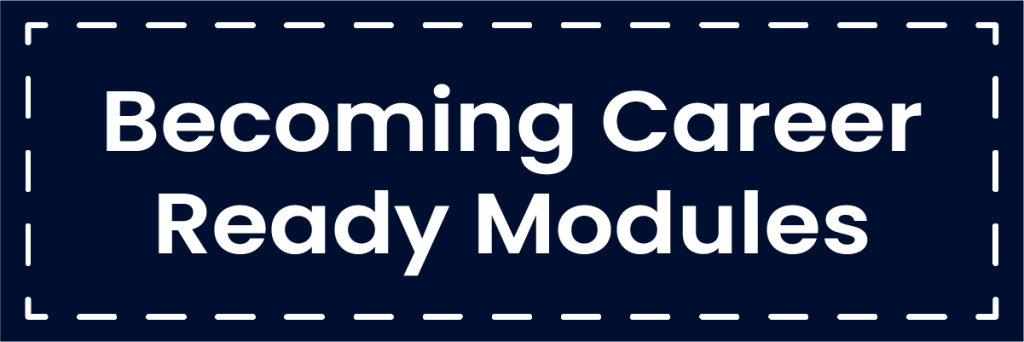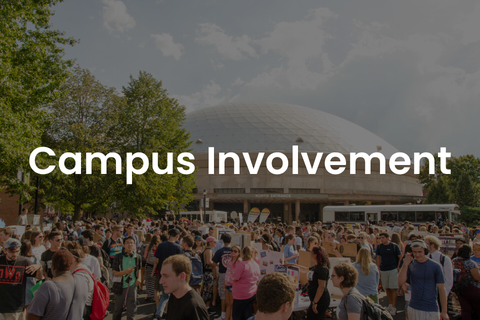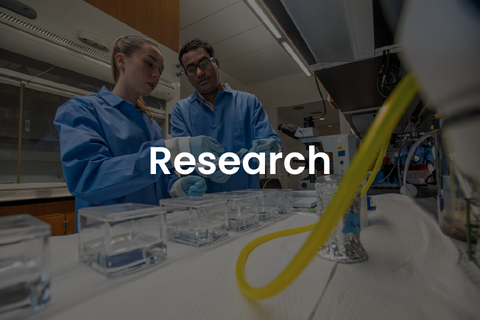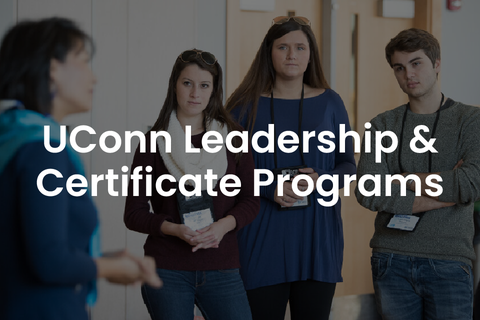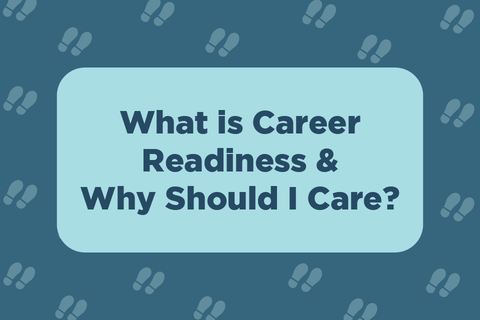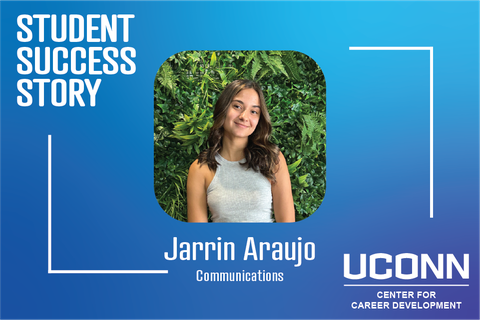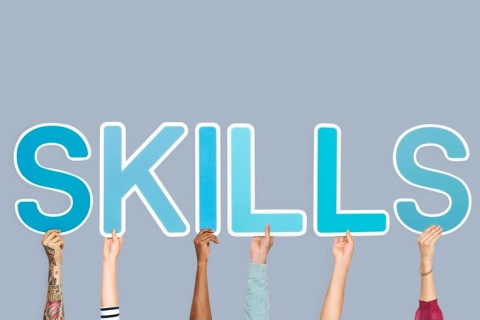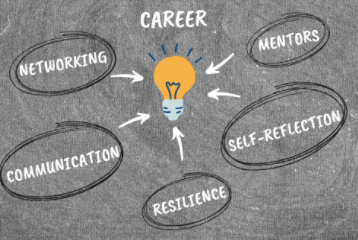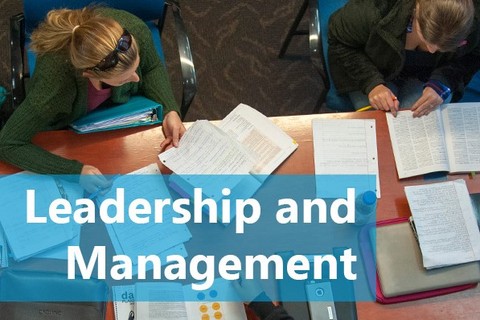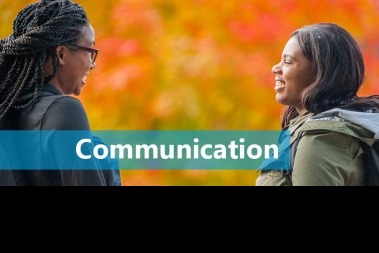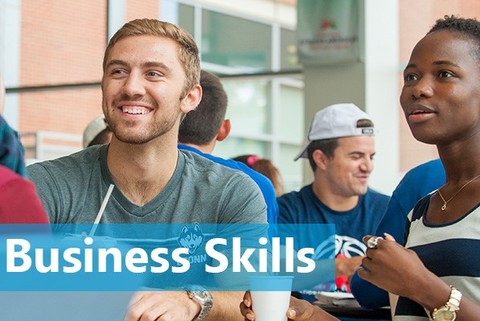What is Career Readiness and why does it matter?
Career readiness is achieved through the attainment and demonstration of core competencies that will help you successfully pursue your career goals. The National Association of Colleges and Employers (NACE) has identified eight core competencies (also known as transferable skills) that are highly valued by employers and considered key predictors of career success. Your experiences at UConn and beyond offer many opportunities to develop and enhance these eight competencies, including participation in classroom projects and assignments, internships, co-ops, research, on-campus involvement, work experience, or other on- or off-campus endeavors.
Learn the Eight Core Career Competencies

Career & Self-Development
Proactively develop oneself and one’s career through continual personal and professional learning, awareness of one’s strengths and weaknesses, navigation of career opportunities, and networking to build relationships within and without one’s organization.

Communication
Clearly and effectively exchange information, ideas, facts, and perspectives with persons inside and outside of an organization.

Critical Thinking
Identify and respond to needs based upon an understanding of situational context and logical analysis of relevant information.
To be demonstrated with or without accommodations.
- Show an awareness of your strengths and areas for development.
- Display curiosity; seek out opportunities to learn new and/or develop existing skills.
- Identify areas and opportunities for continual growth while pursuing and applying feedback.
- Develop plans and goals for your future career.
- Establish, maintain, and/or leverage relationships with people who can help you professionally.
- Advocate for your needs and rights and those of others in the workplace.
To be demonstrated with or without accommodations.
- Frame communication with respect to diversity of learning styles, varied individual communication abilities, and cultural differences.
- Understand the importance and impact of verbal communication, written communication, and non-verbal communication/body language.
- Choose the most effective communication style and messaging for an intended audience.
- Employ active listening, persuasion, and influencing skills.
- When needed, ask questions to receive specific information and/or guidance from relevant supervisors, specialists, and others.
To be demonstrated with or without accommodations.
- Gather and analyze information from a diverse set of sources and individuals to fully understand a problem.
- Accurately summarize and interpret data with an awareness of personal biases that may impact outcomes.
- Make decisions and solve problems using sound, inclusive reasoning and judgment.
- Present and disseminate information to diverse audiences with unique learning styles and perspectives.
- Effectively prioritize work tasks based on urgency and importance.

Equity & Inclusion
Demonstrate the awareness, attitude, knowledge, and skills required to equitably engage and include people from different local and global cultures. Engage in anti-racist practices that actively challenge the systems, structures, and policies of racism.

Leadership
Recognize and capitalize on personal and team strengths to achieve organizational goals.

Professionalism
Knowing work environments differ greatly, understand and demonstrate effective work habits, and act in the interest of the larger community and workplace.
To be demonstrated with or without accommodations.
- Keep an open mind to diverse ideas and new ways of thinking.
- Seek global cross-cultural interactions and experiences that enhance one’s understanding of people from different demographic groups and that leads to personal growth.
- Solicit and use feedback from multiple cultural perspectives to make inclusive and equity-minded decisions.
- Actively contribute to inclusive and equitable practices that influence individual and systemic change.
- Identify resources and eliminate barriers resulting from individual and systemic racism, inequities, and biases.
- Advocate for inclusion, equitable practices, justice, and empowerment for historically marginalized communities.
To be demonstrated with or without accommodations.
- Plan, initiate, manage, complete, and evaluate projects.
- Motivate and inspire self and others to work towards a shared vision.
- Seek out and leverage diverse resources and feedback from others to inform direction.
- Use innovative thinking to go beyond traditional methods; contribute new ideas and suggestions to build on existing methods.
- Serve as a formal or informal role model to others by modeling your own workplace values and competencies.
To be demonstrated with or without accommodations.
- Act equitably with integrity and accountability to self, others, and the organization.
- Understand and adhere to workplace policies and procedures; request appropriate accommodations if/when needed.
- Prepare appropriately for meetings, projects, and other work responsibilities.
- Demonstrate dependability by being present at work and completing assigned tasks.
- Show a high level of dedication toward doing a good job.
- Take accountability for and learn from mistakes.
- Adapt to change and be open to new ways of doing things.

Teamwork
Build and maintain collaborative relationships to work effectively toward common goals, while appreciating diverse viewpoints and shared responsibilities.

Technology
Understand and leverage technologies ethically to enhance efficiencies, complete tasks, and accomplish goals.
To be demonstrated with or without accommodations.
- Collaborate with others to achieve common goals.
- Be accountable for individual and team responsibilities and deliverables.
- Build effective working relationships with supervisor and team members/coworkers.
- Employ personal strengths, knowledge, and talents to complement those of others.
- Interact with and respect diverse personalities.
- Listen carefully to others, taking time to understand and ask clarifying questions.
To be demonstrated with or without accommodations.
- Identify appropriate technology for completing specific tasks.
- Use technology to improve efficiency and productivity.
- Integrate information learned from relevant technology to support effective and timely decision-making.
- Leverage technology to compile and share information with others.
- Be open to learning and adapting to new technologies.
Assess Your Career Readiness

Focus 2 helps you identify what skills and competencies you can improve upon through the “Am I Career Ready” assessment.
